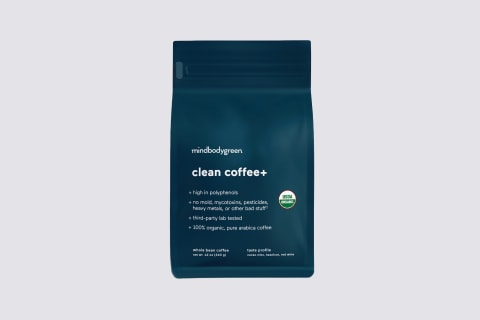Advertisement
New Study Shows Key Differences in Coffee Drinkers' Gut Microbiome


When we think of foods that boost the gut microbiome, probiotic-rich sauerkraut, yogurt, and kimchi likely come to mind. But these aren't the only foods that support a healthy gut. Certain polyphenols—beneficial compounds found in plants—are known to nourish the gut microbiome.
It just so happens that coffee—yes, this often beloved morning ritual—is a concentrated source of polyphenols. And researchers recently investigated how drinking coffee relates to the types and levels of certain bacteria1 found in our guts.
Here's what you need to know.
About the study
Researchers state that this is the largest study to date investigating the link between coffee and the gut microbiome.
First, they gathered detailed dietary information (and habitual coffee consumption) from nearly 23,000 participants—integrating that with publicly available data from 54,198 stool samples from various countries as well as hundreds of other stool and blood samples from other cohorts.
Meaning: These various data points let researchers identify if trends seen in one set of study participants extend to a wider population.
Researchers then classified folks based on their habitual coffee consumption:
- Never: Those who consumed less than 3 cups a month
- Moderate: Those who consumed up to 3 cups a day
- High: Those who consumed more than 3 cups daily
Lastly, they used machine learning to specifically track if these different levels of coffee correlated to changes in the type or level of certain bacteria in the gut.
Drinking coffee increases the prevalence of beneficial bacteria
Results show that coffee intake stimulated the growth of 115 types of bacteria (!!) in the gut—most notably, one by the name of Lachnospiraceae asaccharolyticus (L. asaccharolyticus).
The abundance of this good gut bacteria was up to eight times greater in high coffee consumers compared to never consumers.
Caffeinated and decaffeinated coffee showed similar effects, so researchers attributed this change to the coffee's polyphenol content.
Coffee drinkers with higher amounts of L. asaccharolyticus also showed enrichment of polyphenol metabolites (compounds produced by gut bacteria when breaking down polyphenols) like quinic acid.
What does this mean for you?
In more simple terms:
- Drinking coffee is linked to stimulating the growth of bacteria like L. asaccharolyticus—creating a healthier gut microbiome.
- As coffee compounds are metabolized by gut bacteria, they produce beneficial metabolites like quinic acid (which research shows has antioxidant and protective properties2) and hippurate (which is a marker of metabolic health3).
How to get the most polyphenols from your coffee
All coffee beans contain polyphenols. However, the volume and diversity of those polyphenols vary with roasting, storage, and brewing methods.
If you want to get the most benefits from your brew, it makes sense to choose a coffee that is grown and processed to protect these all-important plant compounds like clean coffee+.
mindbodygreen's clean coffee+ is sourced from organically grown beans in nutrient-dense soil and hand-picked at peak ripeness.
The beans are then roasted and dried in a way that prevents mold and mycotoxins from forming but promotes an impressive array of native polyphenols with antioxidant benefits. We know this because we rigorously test the beans for heavy metals, mycotoxins, pesticides, and solvents, as well as total polyphenols.†
The careful production process also creates a cozy and inviting flavor: rich, slightly sweet, and a little nutty. It's a blend that coffee lovers everywhere are loving.
The takeaway
Drinking coffee comes with so many health benefits (beyond just perking you up). This study is the largest to date on the beverage's impact on gut health. Years of research also show that drinking three to five cups of joe a day is also beneficial for heart health and longevity.
So drink up! (But if coffee isn't your thing, here's what you can eat to support a healthy gut.)
Watch Next
Enjoy some of our favorite clips from classes
Enjoy some of our favorite clips from classes
What Is Meditation?
Mindfulness/Spirituality | Light Watkins
Box Breathing
Mindfulness/Spirituality | Gwen Dittmar
What Breathwork Can Address
Mindfulness/Spirituality | Gwen Dittmar
The 8 Limbs of Yoga - What is Asana?
Yoga | Caley Alyssa
Two Standing Postures to Open Up Tight Hips
Yoga | Caley Alyssa
How Plants Can Optimize Athletic Performance
Nutrition | Rich Roll
What to Eat Before a Workout
Nutrition | Rich Roll
How Ayurveda Helps Us Navigate Modern Life
Nutrition | Sahara Rose
Messages About Love & Relationships
Love & Relationships | Esther Perel
Love Languages
Love & Relationships | Esther Perel
What Is Meditation?
Box Breathing
What Breathwork Can Address
The 8 Limbs of Yoga - What is Asana?
Two Standing Postures to Open Up Tight Hips
How Plants Can Optimize Athletic Performance
What to Eat Before a Workout
How Ayurveda Helps Us Navigate Modern Life
Messages About Love & Relationships
Love Languages
Advertisement

Yes, There's A Longevity Vitamin (& People Over 40 Need To Prioritize It)
Molly Knudsen, M.S., RDN

Study Investigates How Fasting Impacts Sleep, Hormone Health & More
Gretchen Lidicker, M.S.

Yes, There's A Longevity Vitamin (& People Over 40 Need To Prioritize It)
Molly Knudsen, M.S., RDN

Study Investigates How Fasting Impacts Sleep, Hormone Health & More
Gretchen Lidicker, M.S.

Yes, There's A Longevity Vitamin (& People Over 40 Need To Prioritize It)
Molly Knudsen, M.S., RDN

Study Investigates How Fasting Impacts Sleep, Hormone Health & More
Gretchen Lidicker, M.S.

Yes, There's A Longevity Vitamin (& People Over 40 Need To Prioritize It)
Molly Knudsen, M.S., RDN

Study Investigates How Fasting Impacts Sleep, Hormone Health & More
Gretchen Lidicker, M.S.















